Key takeaways:
- Understanding your target audience enhances workshop marketing effectiveness by aligning messaging with their specific pain points and interests.
- Incorporating storytelling and testimonials into promotional efforts creates emotional connections that make workshops more relatable and appealing to potential attendees.
- Interactive agendas and gathering participant feedback are crucial for creating engaging workshops that cater to attendee needs and foster collaboration.
- Evaluating marketing success through participant feedback and engagement metrics helps refine future strategies and improve overall workshop effectiveness.
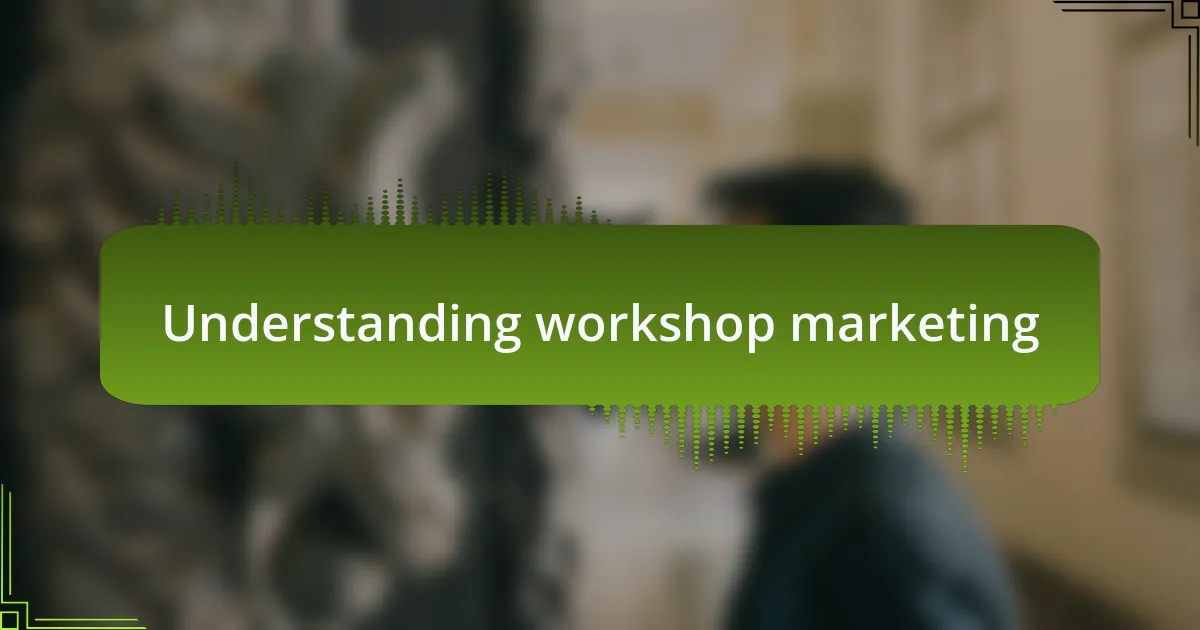
Understanding workshop marketing
Workshop marketing is all about creating a compelling narrative that connects your audience with the experience you’re offering. I remember the first time I planned a workshop; I felt the pressure of drawing attendees. It struck me that I wasn’t just selling a ticket; I was inviting people into a transformative experience. How could I convey the value of what they would learn?
Understanding your target audience is crucial in workshop marketing. I’ve found that truly knowing who you are speaking to lets you tailor your messaging in a way that resonates. For instance, during my last promotional campaign, I drafted emails that spoke directly to specific pain points of potential attendees. The feedback was astounding—people felt seen and understood. Have you ever wondered why some events sell out while others fall flat? Often, it boils down to this very connection.
Another vital aspect is the use of storytelling in your marketing efforts. One time, I integrated testimonials from past participants into my promotional material. It highlighted real transformations and success stories, making the workshop feel more relatable. When prospective attendees can visualize their journey as part of your narrative, they’re more likely to take the plunge and sign up. Don’t you think it’s easier to commit to something when you can see its impact through someone else’s eyes?

Importance of audiovisual expos
Audiovisual expos serve as a vibrant tapestry weaving together innovation, creativity, and community. From my experience attending these events, I’ve seen firsthand how they foster collaboration among industry professionals. Have you ever walked through an expo and felt that electric energy? It’s that interaction, that buzz of ideas being exchanged, which often plants the seeds for groundbreaking projects.
These expos also provide a platform for showcasing the latest technology and trends in the audiovisual world. I recall being captivated at one event by a cutting-edge display that illuminated not just a product but an entire possibility. When businesses showcase their advancements, it encourages others to push their boundaries, igniting healthy competition. Isn’t it fascinating how one breakthrough can inspire an entire industry?
Moreover, attending audiovisual expos opens doors for networking and building meaningful relationships. I’ve frequently left these events with not just business cards but genuine connections that led to fruitful collaborations. It’s remarkable to think: how often do we get the chance to meet our industry heroes in such an accessible setting? These interactions can lead to mentorship opportunities and partnerships that might not have arisen otherwise.
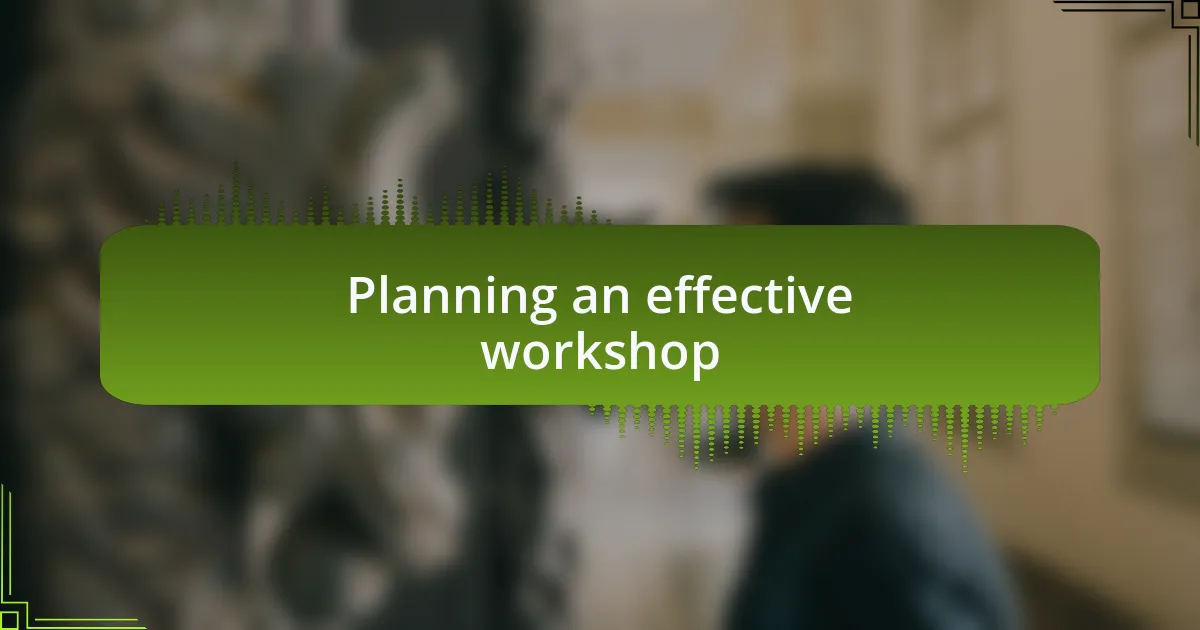
Planning an effective workshop
When planning an effective workshop, my first step is to clearly define the objectives. I remember one workshop where I focused too broadly on general technology trends; it ended up feeling scattered and less impactful. Specific goals allow participants to walk away with tangible skills or knowledge, which ultimately makes the experience rewarding for everyone involved.
Next, I believe in designing an interactive agenda. I’ve found that incorporating hands-on activities creates a deeper connection with the material. For instance, during a recent workshop, we divided attendees into small groups for a brainstorming session on implementing new tools. The energy in the room was palpable, as people exchanged ideas freely. It was a reminder of how collaboration can spark creativity in ways that presentations alone cannot achieve.
Lastly, I can’t stress enough the importance of feedback. After each workshop, I send out a simple survey asking participants what resonated with them and what could improve. Once, I made an adjustment based on feedback suggesting more time for Q&A. The following workshop transformed into an open dialogue, and the engagement levels soared. Isn’t it incredible how small changes can elevate the overall experience?
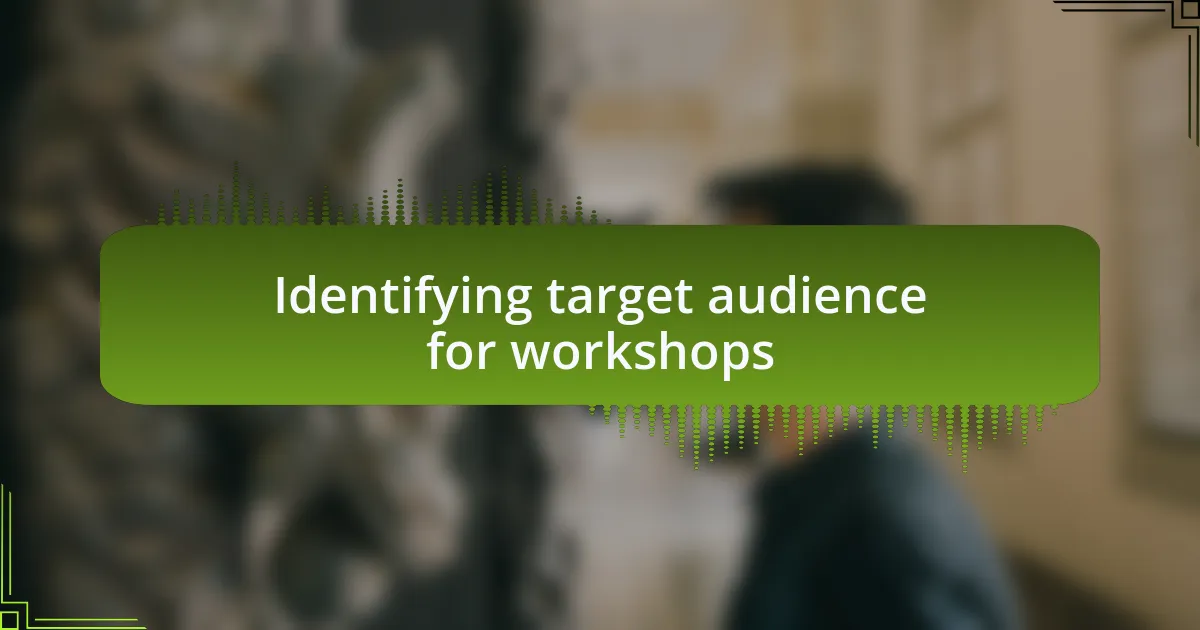
Identifying target audience for workshops
Understanding your target audience for workshops is crucial. I’ve seen firsthand how knowing who you’re speaking to can shape the entire event. For example, while planning a workshop for industry novices, I realized my content was way too technical. Adjusting my language and examples to be more relatable made a huge difference—they felt included and engaged, which is exactly what I wanted.
What’s interesting is how different demographics respond to various topics. In one instance, I organized a workshop for a younger crowd, focusing on emerging digital tools. The excitement in the room was tangible—they were eager to learn and share their own experiences. It made me think: how often do we tailor our content to meet the interests of the audience? This reflection is what drives me to continually refine my approach.
Research plays a crucial role in identifying your audience. I often conduct informal surveys or use social media polls to gather insights about their preferences. I once discovered that a significant portion of my audience was interested in sustainability practices for audiovisual projects. This feedback inspired me to create content that spoke directly to those concerns, ultimately leading to greater attendance and interaction during the workshop. Isn’t it rewarding when you can connect with participants through shared values?
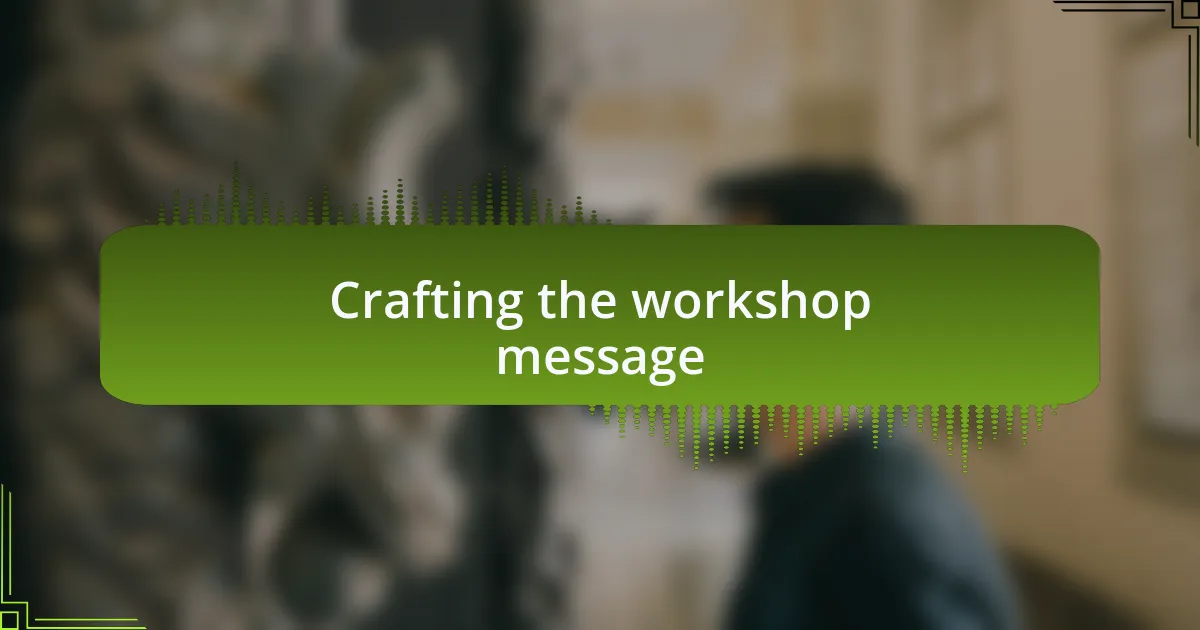
Crafting the workshop message
Crafting the workshop message begins with clarity and resonance. I recall a time when I was preparing a workshop about sound design. Initially, I thought I’d focus on complex theories, but then I considered the audience’s perspective. Simple, engaging examples not only clarified my points, but they also created an atmosphere where attendees felt empowered to participate actively. It made me wonder—how can a clear message transform the learning experience?
Emotion plays a significant role in how a message is received. When I shared my own challenges in the field, attendees quickly connected with my journey. Their nods of understanding told me that vulnerability can strengthen a message. I realized that incorporating personal stories not only humanizes the content but creates an emotional bridge, inviting participants to engage more deeply. Isn’t it fascinating how our struggles can become powerful teaching tools?
Additionally, I focus on the actionable aspects of my message. After one workshop, a participant shared with me that concrete takeaways made all the difference. She felt equipped to implement what she learned right away. It reinforced my belief that a workshop message should leave people not just inspired, but also ready to take action. This balance of inspiration and practicality creates a memorable experience—after all, who doesn’t want to feel both motivated and capable?
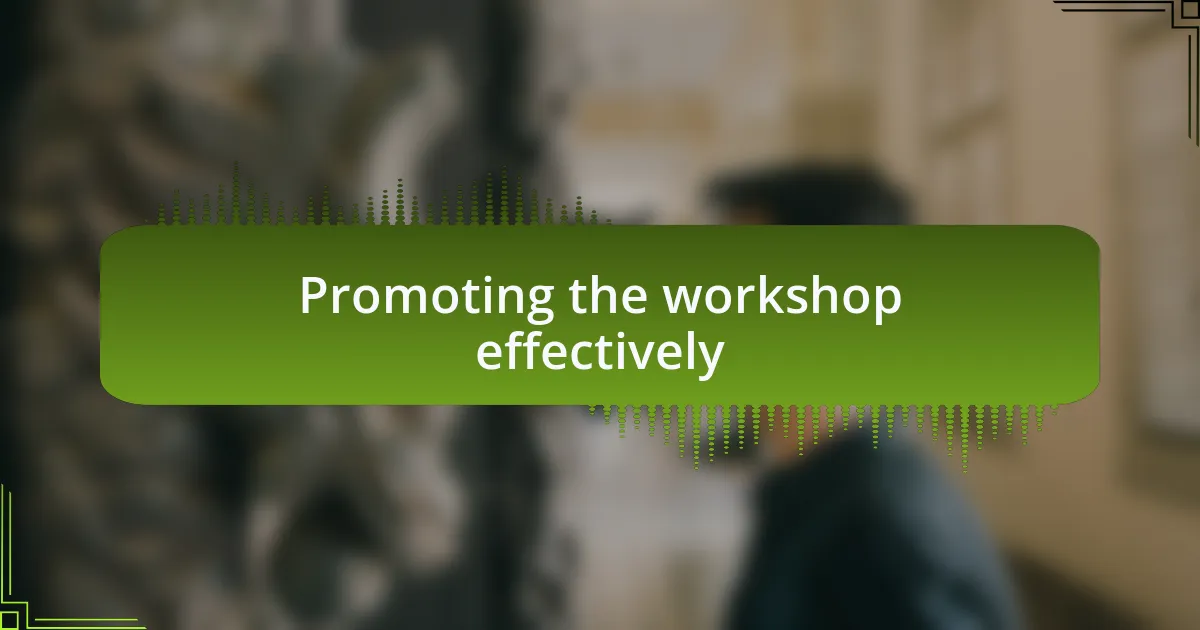
Promoting the workshop effectively
Promoting a workshop effectively demands strategic outreach to capture attention. One time, I created a campaign that utilized multiple platforms, from social media to local community boards. By tailoring my message to each platform, I saw engagement soar; it also made me question how each medium can shape audience perception. What worked on Instagram didn’t necessarily resonate on LinkedIn, highlighting the importance of understanding your audience.
I’ve learned that personal connections can amplify your promotion efforts. Once, at a networking event, I met a potential attendee who was unsure about joining the workshop. By sharing my journey and the transformative experiences others had, I sparked her interest. It made me realize that genuine storytelling can create trust, making people more inclined to participate. Have you ever considered how your own experiences could draw others in?
Lastly, creating a sense of urgency can be a game changer in workshop promotion. I once implemented an early-bird registration discount, which not only incentivized sign-ups but also fostered excitement. The influx of registrations made me reflect on how people often respond to limited-time offers. Do you think urgency is an overlooked tool in getting people to take action? In my experience, it certainly jolts them into making a decision.
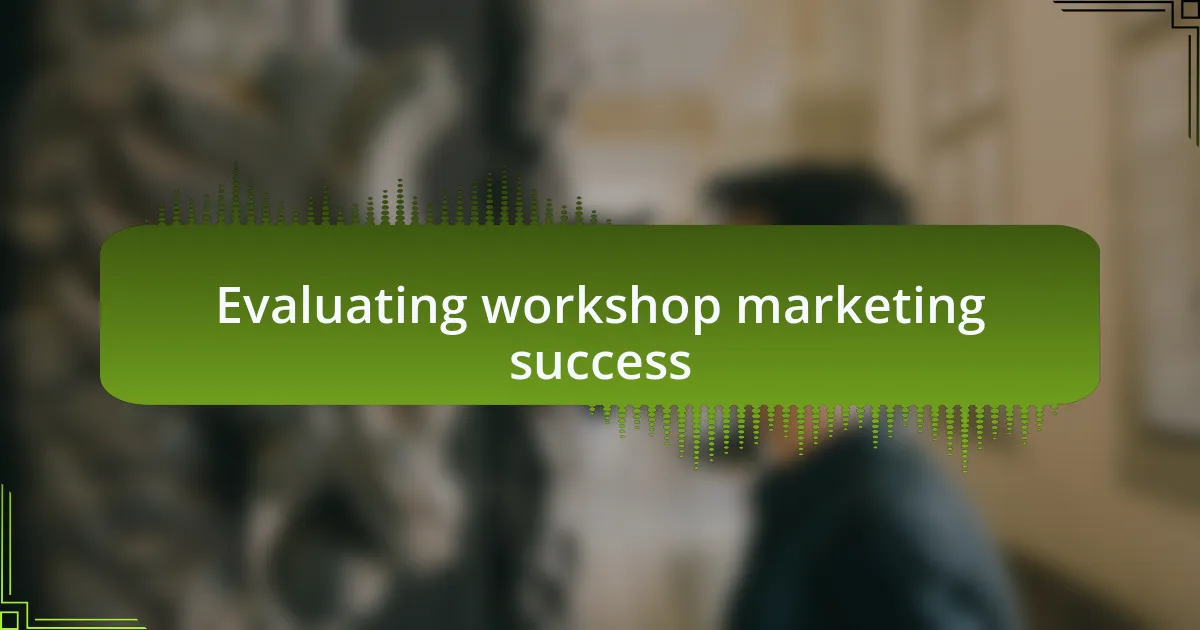
Evaluating workshop marketing success
Evaluating the success of workshop marketing requires an honest assessment of metrics and participant feedback. After one of my workshops, I sent out a survey to attendees, asking them to rate everything from content relevance to the overall experience. The insights were eye-opening; they highlighted the aspects that truly resonated and those that fell flat. Have you ever received feedback that completely changed your approach? I certainly have, and it helped refine my future marketing strategies.
I also track engagement levels across different platforms to gauge what marketing efforts were most effective. For instance, I noticed a significant spike in interest after sharing a behind-the-scenes video of the workshop preparation on social media. This realization led me to wonder: Could visual storytelling be the secret ingredient in boosting workshop visibility? Analyzing such patterns not only informs my decisions but also fuels my creativity for future campaigns.
Furthermore, comparing registration rates before and after implementing specific marketing tactics can reveal invaluable trends. I once experimented with targeted ads showcasing testimonials from past participants, which led to a remarkable increase in sign-ups. The emotional connection those stories evoked made me ask: What if we featured these testimonials more prominently? This exploration of emotional resonance has truly influenced my approach to marketing, reminding me that relatable experiences often drive participation.